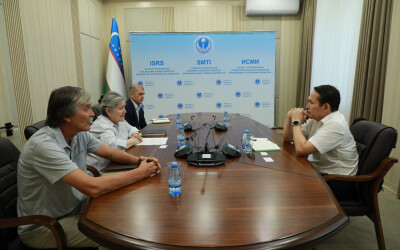Afghanistan’s economic recovery is the key to lasting peace in the country

On August 31-September 1 this year, an important political event took place in Tianjin: the regular meeting of the Council of Heads of State of the Shanghai Cooperation Organization (SCO). Leaders from 20 countries and 10 organizations participated in the summit.
Ahead of the visit, an article by President Shavkat Mirziyoyev entitled “Uzbekistan and the SCO: Cooperation on the Path to Comprehensive Peace and Prosperity” was published. The Leader of Uzbekistan took part in the SCO Council of Heads of State meeting, as well as in the first-ever “SCO Plus” format meeting.
In his speeches, the Head of State paid special attention to the issue of consolidating the efforts of the SCO member states in promoting Afghanistan’s economic recovery.
This is not surprising, since the situation in Afghanistan is a key factor in maintaining security not only in Central Asia, but throughout the entire SCO region.
At the same time, Tashkent proceeds from the assumption that building constructive cooperation with the Afghan authorities, promoting the restoration of a peaceful economy, and involving Kabul in interregional processes are the key to sustainable development.
In this regard, Shavkat Mirziyoyev stated that ensuring stability in the region is impossible without taking into account developments in Afghanistan and establishing constructive dialogue between the international community and the Afghan authorities.
To this end, he called on SCO member states to show political will and promote the socio-economic recovery and integration of Afghanistan into the world community.
In this context, the Leader of Uzbekistan reiterated his support for the resumption of the SCO-Afghanistan Contact Group, one of whose main tasks could be to develop proposals to support socio-economic projects in Afghanistan.
In 2020, during the SCO summit, he proposed adopting a plan for Afghanistan’s socio-economic recovery as part of the implementation of the roadmap for further action by the SCO-Afghanistan Contact Group.
Indeed, Afghanistan’s involvement in interregional processes will have a positive effect on the country’s development. First, it will create the necessary opportunities for doing business and creating new jobs, which, in turn, will help steer the entire system of political and economic relations towards creative development. Second, stability in Afghanistan will become an essential factor in expanding transregional interconnectivity between Central and South Asia. This, in turn, will increase the interest of neighboring countries in investing in Afghanistan’s peaceful development.
Initiatives for Afghanistan’s economic recovery are becoming increasingly relevant against the backdrop of worsening humanitarian and climate crises.
According to the UN, 23 million Afghans are currently in need of humanitarian assistance. A reduction in aid from foreign donors exacerbates the situation. As a result, as of May this year, only 16% of the planned $2.42 billion for the 2025 Humanitarian Needs and Response Plan in Afghanistan had been secured.
In addition, Afghanistan is highly vulnerable to natural disasters. According to the UN International Organization for Migration, in 2024, more than 500,000 Afghans had to leave their homes due to floods, droughts, and other natural disasters. During this period, more than 10 million people were affected by climate threats.
Just recently, on September 1 of this year, an earthquake struck Afghanistan, killing more than 800 people.
In these circumstances, it is crucial to consolidate efforts to assist Afghanistan in rebuilding its economy through the implementation of social, infrastructure, and humanitarian programs and projects.
For its part, Uzbekistan is actively engaging with Afghanistan in trade relations, providing training for Afghan specialists on its territory, and regularly offering humanitarian aid.
In particular, from 2021 to the present, 13 shipments of humanitarian aid totaling more than 12,000 tons have been sent to Afghanistan. Moreover, in 2022, with the support of Uzbekistan, the Maulana Jalaluddin Balkhi Airport in Mazar-i-Sharif, Afghanistan, was restored.
The Termez International Trade Center and the Termez Cargo Center International Transport and Logistics Hub play an essential role in expanding bilateral cooperation with Kabul. These infrastructures create conditions for Afghanistan’s integration into transregional processes between Central and South Asia.
As a result, trade between Tashkent and Kabul has been growing steadily over the past three years. In 2024, it exceeded $1 billion, representing a 13% increase from 2023 ($867 million). Uzbekistan exports electricity, fertilizers, and hydrocarbons to its neighbor, and imports Afghan dried fruits, juices, and carpets.
This consistent policy of involving the de facto Afghan authorities in dialogue is not an end in itself. It will contribute to establishing Afghanistan as a friendly and responsible neighbor and partner.
In general, an approach focused on Afghanistan’s economic recovery is the key to long-term peace. At the same time, stability in Afghanistan is a key factor in maintaining regional security within the SCO.
In turn, the Shanghai Cooperation Organization’s active participation in normalizing the situation in Afghanistan will enhance its status as a responsible multilateral structure that makes a significant contribution to maintaining regional and international security.
Umarbek Nuriddinov,
Chief Research Fellow,
Institute for Strategic and Regional Studies under the President of the Republic of Uzbekistan
Previous

On August 29, 2025, the Institute for Strategic and Regional Studies under the President of the Republic of Uzbekistan (ISRS) hosted a working meeting with Yeraly Beksultan, Senior Specialist at the World Bank’s Uzbekistan Office.
01.09.2025





